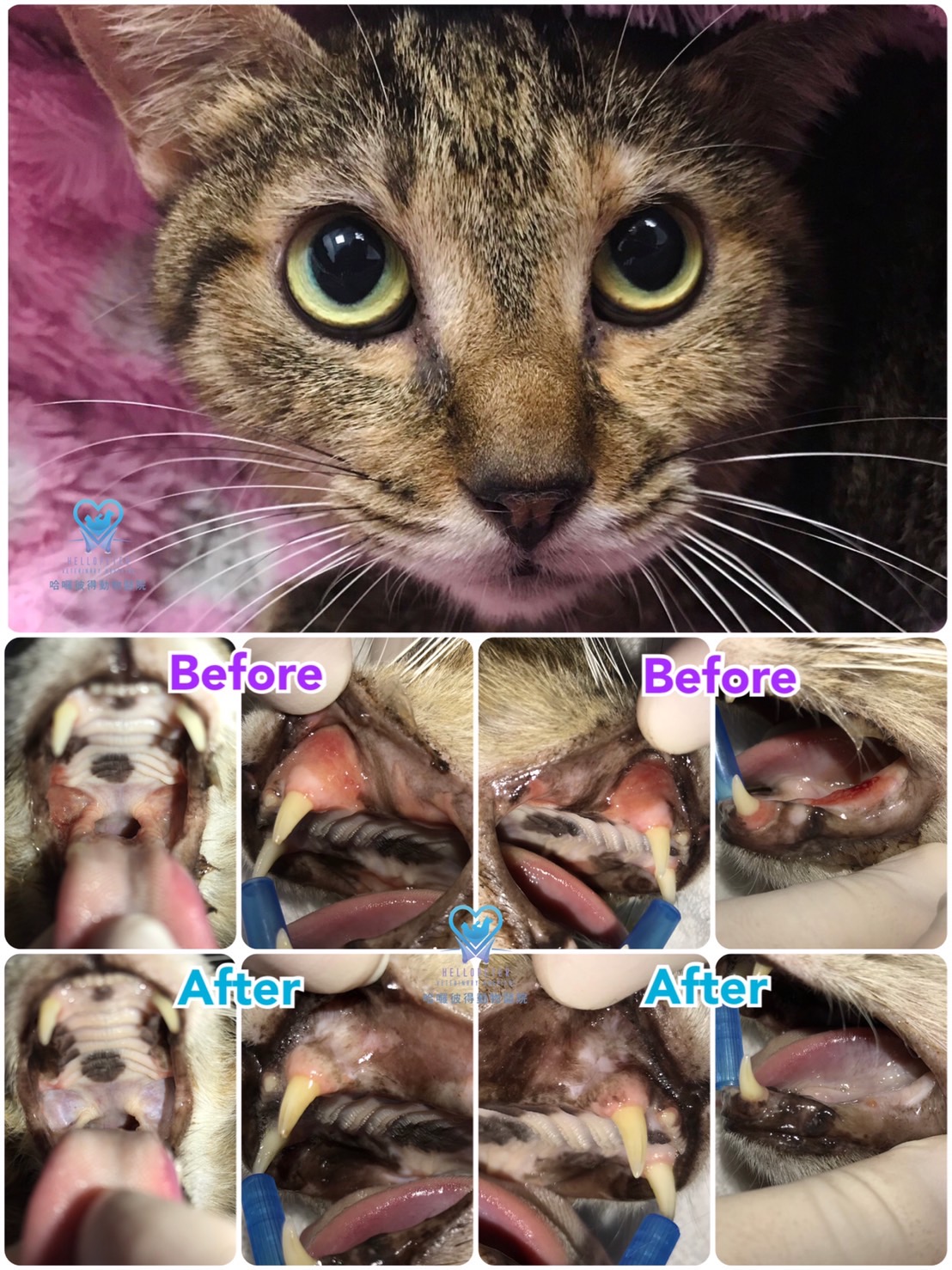Added on January 2, 2023 - Healing of FCGS in an 8-year-old tabby female cat through Mucogingival Replacement Surgery (MGRS).

“Pu-Jiu”, a tabby female cat suffering from chronic gingival stomatitis (FCGS, hereinafter referred to as stomatitis), had tried steroids and half full-mouth extraction before coming to our hospital for treatment, none of the above treatments were effective. The patient’s appetite decreased significantly, and the gingiva and oral mucosa were prone to bleeding, at the first visit, she still took the medicine prescribed by another hospital to control the symptoms, and the medicines could not be stopped. The patient was very nervous and anxious, and often had excessive grooming (plucking) behavior, the owner must let the cat wear clothes to temporarily stop it.
After the 7-year-old Pu-Jiu received the Mucogingival Replacement Surgery (MGRS) treatment by Dr. Chung-Wei Chen, the excessive grooming (plucking) behavior of the patient gradually improved and the appetite gradually increased.
After a year of treatment, the patient's stomatitis (FCGS) has been completely cured. She stopped taking antibiotics and analgesic drugs, has a good appetite, no more excessive grooming (plucking) behavior and no need to wear clothes to prevent it, and the weight of the cat has increased from 4kg to 4.45kg. The patient’s stomatitis (FCGS) has been cured, and she can maintain a good quality of life without using any medicines.
Feline chronic gingivostomatitis (FCGS) is one of the common oral diseases in cats. The main symptoms are:
- The gingiva and oral mucosa are red, swollen, ulcers or hyperplasia. All soft tissues in the mouth, including the gingiva and all parts of the oral mucosa (including buccal, lingual, sublingual and oropharynx, etc.), will have redness, ulceration or hyperplasia.
- Cats will lose their appetite or even refuse to eat because of mouth pain, or they will keep shaking their heads and scratching their mouths with their front feet when eating and drinking.
- The patient's saliva usually has a peculiar smell, even putrefactive odor, due to ulcers.
At present, the most common treatments are long-acting steroid injections or oral steroids, combined with antibiotics, and tooth extraction, etc., but the effect of individual treatment varies greatly, furthermore, tooth extraction will likely cause the cat's oral cavity to collapse and alveolar bone loss. They need lifelong medication and can't stop it.
Dr. Chung-Wei Chen's original Mucogingival Replacement Surgery (MGRS) aims to solve the above-mentioned sequelae and difficulties in the treatment of stomatitis, and make cats with FCGS no longer need to take medicine for a long time after recovery, and return to the normal life they had before the illness.
If you want to see more cat patients cured by MGRS in our hospital, please refer to our official website (
www.hellopeter.com.tw/contents-4. html) or Facebook fan page album (
www.facebook.com/media/set/?set=a.1308046286294231&type=3).
HelloPeter Veterinary Hospital
Director: Dr. Chung-Wei Chen (Dr. Richard Chen)
YouTube channel:
https://www.youtube.com/@DrRichardChen_vet
Facebook: www.facebook.com/vet.dentistry.oral.medicine/
Instagram:hellopeter_ah
Phone: +886-4-2472-8828
Address: No. 29, Sec. 2, Dongxing Rd., Nantun Dist., Taichung City 408, Taiwan
Hospital Hours: Monday to Friday 10:00~20:00 (by appointment only), 12:00 to the end of all appointments on Saturday, Closed on Sunday
#
陳重威獸醫師 #
哈囉彼得動物醫院 #
HellPeterVeterinaryHospital #
動物牙科推薦 #
寵物牙科推薦 #
牙齦黏膜置換手術 #
mucogingivalreplacementsurgery #
MGRS
#
貓 #
貓口炎 #
口炎貓 #
狗口炎 #
口炎狗 #
cat #
dog
#
動物口腔外科 #
獸醫牙科 #
pet



